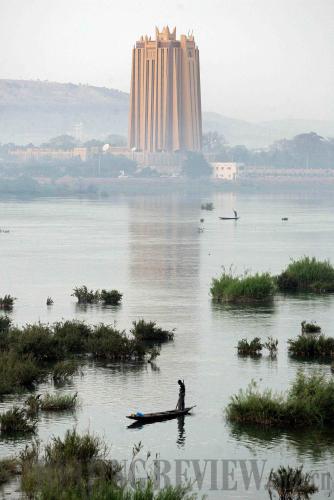| This year marks the 50th anniversary of independence of 17 Sub-Saharan African nations who broke free from colonial rule between January and December of 1960. An eventful year indeed. In the wake of the global recession, Africa appears to have taken the world by surprise, with rising GDP growth and collective GDP of $1.6 trillion. How much do these figures constitute a "fiscal independence?" Also what lies ahead for the youth of Africa half a century after the the demise of colonialism? ChinAfrica looks at these issues against the backdrop of African nations celebrating political independence in 2010.
 |
|
COMING UP: The Central Bank of West African States building rises like a metaphor for Africa's development in the Mali capital of Bamako on the Niger River |
If recent reports from consultancy McKinsey & Co. and the much awaited Africa Progress Report, assessing the state of the continent during the past five years (2005-10), are anything to go by, the continent's catastrophic series of "false dawns" since the demise of colonialism - structured around a raft of anti-democratic neoliberal policies and development politics, have given way to an Africa emerging into its own.
"Africa's economic pulse has quickened, infusing the continent with a new commercial vibrancy," declared McKinsey Quarterly, the business journal of McKinsey & Co. "Real GDP rose by 4.9 percent a year from 2000 through 2008, more than twice its pace in the 1980s and '90s."
"Africa's collective GDP, at $1.6 trillion in 2008, is now roughly equal to Brazil's or Russia's," continues the report, titled "What's Driving Africa's Growth," "And the continent is among the world's most rapidly growing economic regions. This acceleration is a sign of hard-earned progress and promise."
Resource driven
The primary secret driving an average GDP growth of 4.7 percent in Sub-Saharan Africa is Africa's resources: Six of the world's 10 major diamond producers in the world are African nations, while almost 10 percent of global gold production is produced in Africa, with South Africa alone hosting 40 percent of gold. More than 9 percent of proved global oil reserves are on African soil, as well as 40 percent of the world's mineral resources such as cobalt, 15 percent of fertile land, and 10 percent of freshwater sources.
To this end, South African President Jacob Zuma announced the continent "was open for business, for trade and investment."
Drawing on data produced by the Kennedy School Index of Good Governance, identifying improved governance in 38 nations since 2000 and the African Union's Peer Review Mechanism hosting 30 signatory nations, Zuma stated that the world was "finally beginning to move beyond myths about Africa," often portrayed as an poverty-stricken undifferentiated mass, mired in conflict, with an innate incapacity for civilization.
Zuma's speech replicated the language of former South African President Thabo Mbeki's declaration at previous G8 Summit in Kananaskis, hosted by Canada in 2002: "signifying the end of the epoch of colonialism and neocolonialism."
The Summit (2002), hosted the year of the African Union's birth, catapulted Africa to the fore of the "development" agenda via the G8 Africa Action Plan, a set of eight commitments by G8 countries, tasked to African Personal Representatives (APR) appointed by G8 governments.
But as the report indicates, the most significant vehicle of progress in Africa may no longer be the G8 nations i.e.: traditional "creditors" and resource-importers making up the Organization for Economic Cooperation and Development's Development Assistance Committee. Instead, new entrants, chiefly China, Brazil, and the Gulf countries have quickly become power players on the continent, earmarking 30-50 percent, 27-30 percent, and 11 percent of aid budgets for Africa.
In contrast to the West's framing the continent as innately rather than deliberately impoverished through odious debt payment to multilateral institutions including the World Bank and IMF, emerging nation investors such as China and Brazil generally perceive Africa's 53 nations as equal partners.
During the recent Forum on China-Africa Cooperation, Chinese Premier Wen Jiabao revealed that Beijing has already developed 2,200 km of railways, 3,300 km of roads and 1,600 processing projects, a significant step forward for a continent receiving just 4 percent of FDI allocated toward infrastructure prior to Beijing's entry.
|